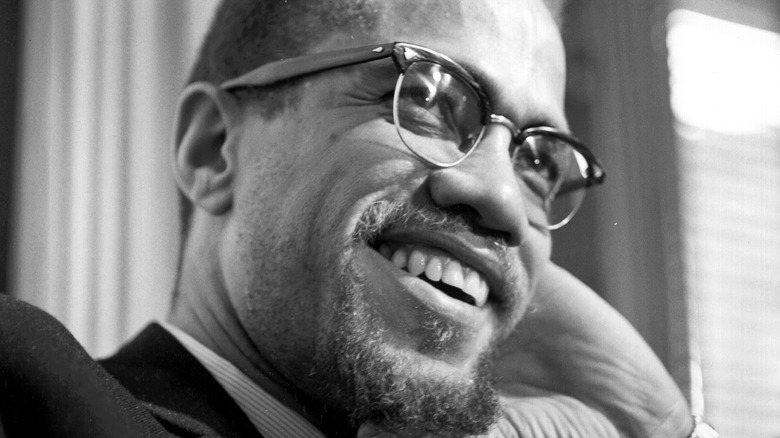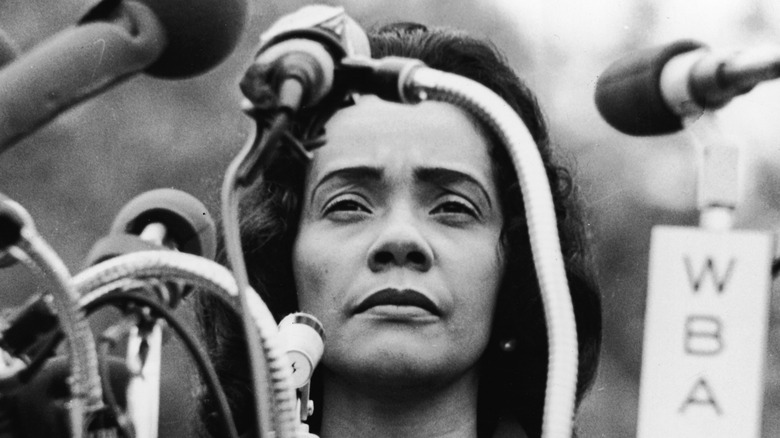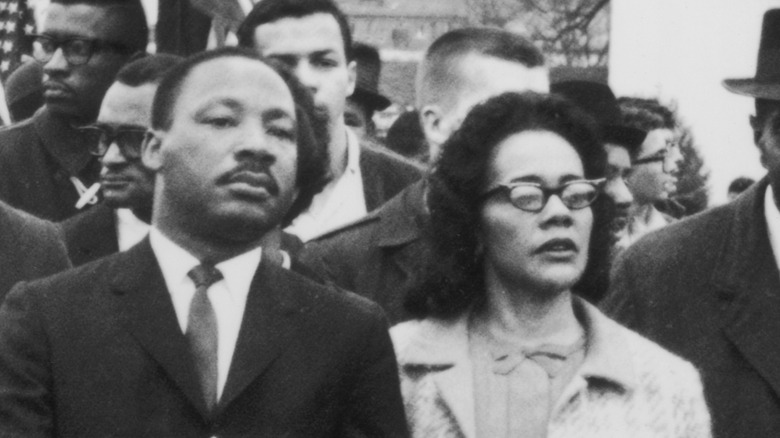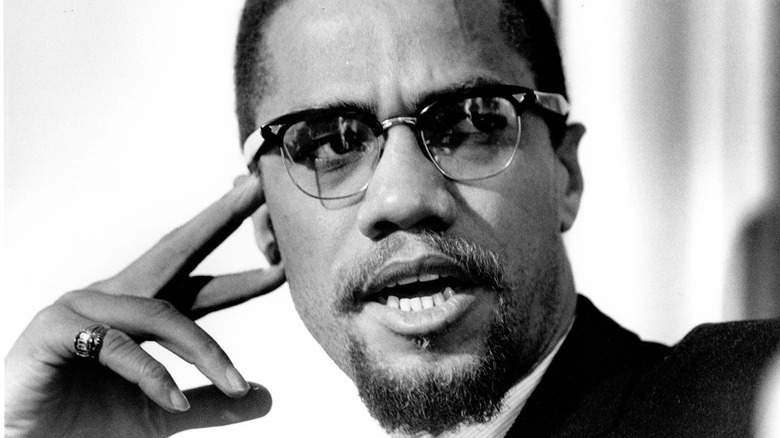The Only Meeting Between Coretta Scott King And Malcolm X
Civil Rights Movement icons Malcolm X and Coretta Scott King met exactly once. That meeting took place in Selma, Alabama, in 1965 during a campaign for voting rights. Civil rights activists chose to focus on Selma for two reasons, according to the Martin Luther King Jr. Research and Education Institute at Stanford University. First, only 2% of the Black residents in the city were on the voting rolls. However, the population was about 50% Black, according to the Equal Justice Initiative. Second, Sheriff Jim Clark directed local law enforcement to use aggressive tactics that activists thought would help generate sympathy for the Civil Rights Movement and persuade President Lyndon B. Johnson to work with Congress to pass voting rights legislation, according to Stanford.
Martin Luther King Jr. arrived in Selma to support the campaign on January 2, 1965. On February 1, 1965, he marched to the Dallas County Courthouse with more than 250 other activists who attempted to register to vote, according to the Equal Justice Initiative. Instead, King and all of the other activists were arrested for parading without a permit. King's arrest set the stage for the meeting between Malcolm X and Scott King.
Sharing a pulpit
Malcolm X and Coretta Scott King met at a mass church meeting in Selma following Dr. Martin Luther King Jr.'s arrest, as she later recalled in a 1998 Blackside Inc. interview. The two movement leaders represented different approaches to the question of how to achieve freedom for Black Americans. Scott King supported her husband's belief in non-violence, while Malcolm X thought that Black people should be able to use any means necessary, including violence. However, when Malcolm X arrived in Selma, he was also at a transitional point in his thinking, according to LRNG. He had recently returned from traveling through the Middle East and West Africa, and during his travels, he came to believe that it was possible for Black people to work with white allies in their struggle for freedom.
Scott King arrived at the church just after Malcolm X had spoken. Southern Christian Leadership Conference Executive Director Andrew Young approached her and asked her to speak. "Coretta, you're going to have to speak today because Malcolm X is here," Young said, as Scott King later recalled in her Blackside Inc. interview. "He's just spoken, and he has aroused the people, and you need to speak because you need to, ah, you know, to set a nonviolent tone." While Scott King said that she was not in the mood to give a speech, she eventually relented.
The exchange
After Coretta Scott King spoke, she sat down next to Malcolm X in the pulpit. "I felt a little nervous because I hadn't met him before, and I really didn't know what he was going to be like," she recalled in her Blackside Inc. interview. Malcolm X then turned to her and explained the reason he had come to Selma. First, he said that he wanted to visit her husband, Dr. Martin Luther King Jr., in jail but would not be able to because he had to return to New York so he could attend an African student conference in Europe. However, he asked her to pass on a message. "I want you to say to him that I didn't come to Selma to make his job more difficult, but I thought that if the white people understood what the alternative was that they would be more inclined to listen to your husband. And so that's why I came," he said.
Scott King then thanked him for his message. It was a brief exchange, but it had a lasting impact on Scott King, who was surprised by his words. "I didn't expect him to say that," she recalled. "I don't know what I expected. But he had such a gentle manner, and he seemed very sincere."
A tragic loss
Sadly, just weeks after his encounter with Coretta Scott King, Malcolm X was assassinated. On February 21, 1965, he was shot while speaking on the stage of the Audubon Ballroom to the group he founded, the Organization of Afro-American Unity, according to History. Although she had only met him for a brief moment, the news affected Scott King deeply. "I had met him now, and I felt that it was such a tragic loss," she recalled in her interview with Blackside Inc.
Malcolm X's words in Selma convinced Scott King that he had developed a better understanding of Dr. Martin Luther King Jr.'s philosophy of non-violence. She felt that if he had survived later into the 1960s, he could have helped to unite Black people with differing beliefs about how to move forward with the Civil Rights Movement. "For days, I had this pain almost like, this feeling in my chest, a feeling of depression, and, ah, just feeling as if, ah, I had lost someone very dear to me, and I, you know, I couldn't quite understand, but then I began to realize, ah, I guess what an impact he had made on me in that very short period of time in knowing him," Scott King said.



